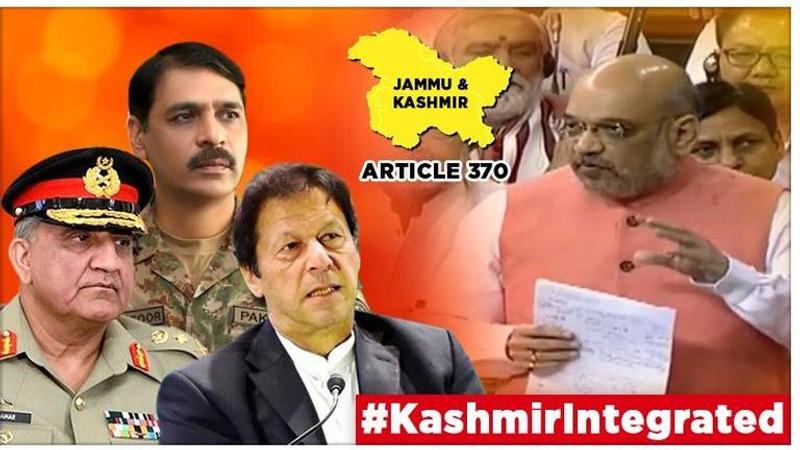Published 15:07 IST, August 6th 2019
J&K's Article 370 scrapped: Indian High Commission in Pakistan asks Imran Khan govt for increased security
Indian High Commission in Pakistan has asked Pakistani authorities to increase security around its premises in Islamabad

As the Jammu and Kashmir Reorganisation Bill 2019 is being discussed in the Lok Sabha, Indian High Commission in Pakistan has asked Pakistani authorities to increase security around its premises in Islamabad. Earlier, interfering in India's domestic decision, Islamabad "rejected" the announcement.
Pakistan holds crucial meetings:
Meanwhile, Pakistan's president Arif Alvi summoned joint session of Parliament. The session will review the tense situation in Jammu and Kashmir and along the Line of Control. It will also suggest the government a plan of action to deal with the fallout of India's decision.
Another meeting is chaired by Army chief General Qamar Javed Bajwa of the Corps Commanders and discuss the security situation even as India exposed the attempts of Pakistan to attack Kashmir. In a joint press brief,Chinar Corps Commander Lt General KJS Dhillon and J&K DGP Dilbag Singh in Srinagar on Friday revealed that they had intelligence inputs that there were attempts of attacks on Amarnath Yatra by Pakistan and that they had recovered IEDs and US made Sniper rifle in the route of the Amarnath Yatra. Indian government has deployed 38,000 paramilitary troops in the Kashmir valley.
HERE'S WHAT THE SCRAPPING OF ARTICLE 370 WHICH CAME INTO BEING IN 1949, MEANS FOR JAMMU AND KASHMIR:
1. INTEGRATION: It is the single biggest move for integration of Kashmir with India since the accession order was signed in 1947 because it means that the state of Jammu and KAshmir will be guided by the Constitution of India and not the constitution of Jammu and Kashmir-- which was the case to this point.
2. AZADI HAS NO BASIS: With 370 going, it means that the entire state of Jammu and Kashmir has completed its unification with the rest of India and any murmurs of Azadi or secessionism have no basis anymore.
3. 35 A GOES: With 370 going, it means that 35 A has no basis anymore because 35A was brought as a provision by way of the existence of Article 370. So, this means that all the provisions that deny non-Kashmiris into Kashmir in terms of jobs, opportunities and residence comes to an end
4. EVERY LAW THAT APPLIES TO THE REST OF INDIA APPLIES TO J&K: With 370 going, Kashmir doesn’t function as a separate entity anymore. Every law and legislation that applies to the rest of India will automatically apply to J&K. To this point, when a Bill was passed in Parliament, it had to be re-passed in the J&K assembly to be applicable in J&K. That won’t be the case anymore.
5. IPC REPLACE RPC: With 370 gone, the RPC will be replaced by the IPC and every amendment of the constitution applicable to the rest of India will automatically apply to Kashmir as well. RPC was the version of the penal code in Jammu and Kashmir, but with this massive move-- the same IPC that applies in every other state and UT will not apply to J&K.
6. J&K GETS EQUAL STATUS: With 370 going, it means that the very Article that granted “Special Status” to Jammu & Kashmir comes to an end, making the state as much a part of India as any other region in the Indian territory without any riders to it.
7. PARLIAMENT WILL BE FINAL WORD: With 370 gone, it means that the Parliament of India will be the final word on matters of legislation and not the assembly.
8. ASSURANCE OT EVERY STAKEHOLDER: With 370 going, it means West Pakistan refugees or Dogras or Bakarwala or Pandits-- all have EQUAL STAKE in the state.
9. ARTIFICIAL BARRIERS REMOVED: INDIAN CITIZENS FROM OTHER STATES WILL NOW FACE NO BARRIER IN BUYING PROPERTY IN J&K, GETTING GOVT JOBS, OR SCHOLARSHIPS.
10. CITIZENS VS NON-CITIZEN DIVIDES ENDS IN J&K: 1.5 to 2 lakh people migrated to Jammu and Kashmir after 1947 are not regarded as "state subjects" under the Jammu and Kashmir Constitution. This will now change with 370 going, since J&K will be as much part of India as any other state or UT.
11. MORE INVESTMENT IN THE VALLEY: Disallowing non-residents from investing in the state held back multinationals and manufacturing firms from setting up and expanding in j&k. This will come to an end now.
12. GREATER SCOPE OF GROWTH: Universities could not hire professors or outsource their resources. All this had the effect of restricting the scope for growth. This will now end because Kashmir is now open to all and integrated with the rest of the country.
And in addition to all of the additional designation of Jammu and Kashmir as a UT and Ladakh as a separate Union Territory also comes as a master move. Jammu and Kashmir as a UT will follow the Delhi model where the control over land, law and order and IAS will be with the Union Government. This will not only keep corruption at the local level in check and end the regional disparity, but will also ensure that LAW AND ORDER is the responsibility of the Union Government of India.
Updated 15:46 IST, August 6th 2019




